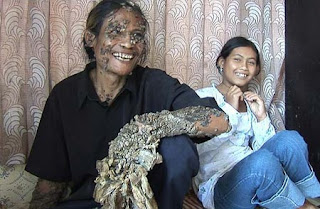Ever heard of “tree man”? Well, what he suffers from is verrucous carcinoma, and it is a slow growing squamous cell carcinoma that can not only grow on the skin of your face and hands but can manifest itself in your genitals as well. Strangely, there have been more cases of the genital form lately, and people are hesitant to go to their HCP because they really don’t know what it is, and are worried that it might be an STD. Honestly, I don’t really get that thinking…if I thought I had an STD my butt would be waiting to see the doors open at my HCP’s office to get treated! But, I digress. I want you to be aware of the various forms and signs of a verrucous carcinoma because it can be surgically removed and has a better response when treated early as opposed to waiting until you look like a tree.
 |
| www.thatsweird.net |
What is it exactly?
A locally aggressive, slow growing squamous cell carcinoma (a tumor of the epithelium- your top layer of skin, that doesn’t usually metastasize, and it usually affects the oral cavity, larynx, genitals, skin (hands and feet specifically), and esophagus. It is also known as an Ackerman tumor OR in the genitals a Buschke-Lowenstein tumor. And, it has not yet been proven, but it is thought to be due to the HPV (Human Papilloma Virus) that either activates the cancer to grow or is the tumor. HPV-16 (that strain) has ben found with almost all (some weren’t studied) penile, vulvular, and anal verrucous carcinomas, which is tough to study, kind of a “chicken or the egg” type of question, but it is assumed that in those cases the HPV causes the tumor.
What are the signs and symptoms?
Oral Verrucous Carcinoma:
-White patchy lesions on the back of the throat
-The patchy lesions will progress to more cauliflower like lesions that are white, soft, and cover larger areas in your throat
-They can occur on your tongue, tonsils, under your tongue, on your gums, and in the inside of your lips
-Usually patients present at a later stage because they don’t report the signs early
 |
| www.accentu8dental.com.au |
Anal/genital Verrucous Carcinoma:
-Begins as a small ulceration in the genital or anal area
-They also progress to larger cauliflower-like white lesions that are painless
-They are commonly seen on the glans penis in uncircumcised men, but can also be found in the vaginal, bladder, cervix, perianal, scrotal, vulvular, and pelvic organs.
-They grow deep roots and have a high rate of recurrence, despite surgical and laser removal techniques
 |
| emedicine.medscape.com/article/1102225-overview |
Palmoplantar Verrucous Carcinoma:
-Usually found on the bottom of the feet but can also be on toes, over toe knuckles, and can be on amputates stumps.
-Found on long standing scare specifically after gun shot wounds and burn scars.
-Start as ulcerations that drain foul smelling fluid
-Can start as one ulceration and it will get larger and spread
 |
| emedicine.com |
 |
| msdlatinamerica.com |
Who is more apt to get it?
White males ages 55-65 are at highest risk for all forms of verrucous carcinoma EXCEPT the genital/anal form is highest in white males ages 18+. Your risk is increased if you smoke, use chewing tobacco, alcohol consumption, betel nut chewing, and chronic inflammation (from poor oral hygiene in oral VC and chronic cellulitis or decubitus ulcers for legs/feet). As well, the scars from prior gun shots and wounds can put you at higher risk (as stated above).
Diagnosis:
– A skin biopsy is performed to learn what is causing the lesion and determine an exact diagnosis.
-A CT scan will be performed once you are diagnosed to assess how deep the lesion goes internally so that your surgeon can plan your operation for removal.
Treatment:
Depending on the depth of the lesion, either laser removal or surgical excision will be performed. Surgical excision is usually required as the patients with VC usually present at a later stage and the lesions have grown internally as well as externally. The surgeon will need to cut out the lesion and around the area until the margins are clean, meaning until they get to healthy skin that is non-affected. There is also the option with early presentation of VC that they can be “frozen” off with liquid nitrogen, but it is like laser removal that the tumors need to be very early in development. As well there are options of radiation and topical chemotherapy, but radiation has a high rate of transformation of the tumor to a more aggressive form of skin tumor and chemotherapy use has not been proven highly successful as a treatment.
Recurrence:
There is an average of 6-40% recurrence rate (couldn’t be a more ridiculous statistic, right?) but it depends upon your other health problems, and at what stage the tumor was caught. When caught earlier, with proper treatment, the recurrence rate is lower.
Prevention:
Due to the cause of VC being not completely understood, the best advice is to treat the risks like those of HPV and any other STD (use condoms, limit your sexual partners, get regularly tested), assess your body for new skin lesions or any changes and go to your HCP when you notice any changes, and get skin mapped yearly and build up a relationship with an dermatologist that you trust. If you have any chronic swelling due to any other medical problems, just be aware that this is a risk, and look for the signs and symptoms, and discuss your risk with your HCP.
Prevention, knowing what to look for, and open communication are the cornerstone to good health. So, Happy Holidays to all and don’t turn into a tree!!
Yours in Good Health
B






